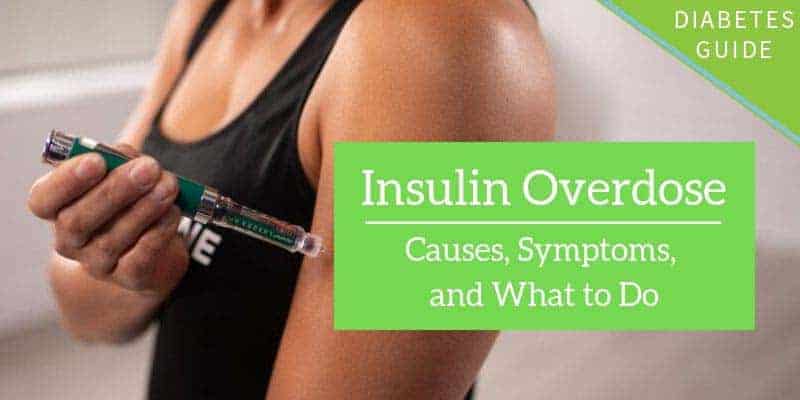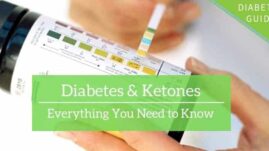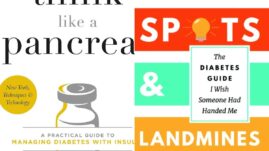Everybody needs insulin to survive! Without enough or any insulin, your body cannot use the food you eat for energy, and blood sugar levels rise to dangerous and eventually fatal levels.
This makes insulin one of the most important hormones in your body, but just as too little insulin can be life-threatening, too much insulin — an insulin overdose — is equally dangerous.
In this article, we will look at how to spot the warning signs of an insulin overdose, how to treat it, and how to prevent it from occurring in the first place.

What is an insulin overdose?
An insulin overdose is defined as simply getting too much insulin to the point of causing low blood sugar (hypoglycemia) — but the severity of that low blood sugar can vary wildly based on how much excess insulin was taken.
Symptoms of an insulin overdose
Early symptoms of an insulin overdose are the same as symptoms of low blood sugar:
- Feeling shaky
- Being nervous or anxious
- Sweating, chills, and clamminess
- Irritability or impatience
- Confusion
- Fast heartbeat
- Feeling lightheaded or dizzy
- Hunger
- Nausea
- Color draining from the skin (pallor)
- Feeling Sleepy
- Feeling weak or having no energy
- Blurred/impaired vision
- Tingling or numbness in the lips, tongue, or cheeks
- Headaches
- Coordination problems, clumsiness
- Nightmares or crying out during sleep
Severe hypoglycemia (below 40 mg/dL) from an insulin overdose can lead to:
- Being unable to talk, chew, or swallow
- Losing consciousness – because your brain isn’t getting the glucose it needs to function
- Seizures – because your brain isn’t getting the glucose it needs to function
- Death – because every part of your part requires glucose in order to function
Causes of an accidental insulin overdose
In life with diabetes, trying to balance your insulin needs with the variables of food, activity, stress, weight management, etc. is a constant challenge. Just one or two units of insulin more than your body needs can easily lead to even the earliest symptoms of an overdose.
Here are the general causes of an accidental insulin overdose:
- Taking a dose of insulin for your meal twice
- Taking your long-acting insulin twice in one day when you normally take it once
- Taking insulin for a planned meal but forgetting to eat
- Overestimating the amount of insulin needed for a meal
- Overestimating the amount of insulin needed to correct a high blood sugar
- Exercising with too much insulin in your bloodstream / not enough glucose
- Taking your rapid-acting insulin instead of your long-acting, or vice versa
- Prescribed an insulin dose that doesn’t fit your body’s needs
- Changes in your insulin sensitivity like losing weight, improved diet, decreased stress, exercising more, etc.
- Taking insulin for a high-carb/high-fat meal that digests too slowly to match the peak of your insulin
Treating an insulin overdose
How you treat an insulin overdose depends on how much excess insulin was dosed. If it was just a few units and you’re mentally clear and capable of feeding yourself, the low blood sugar should be easily corrected with a small snack.
The greater the overdose of insulin is, the more likely you’ll need more serious medical intervention.
Let’s take a closer look.
For mild insulin overdoses: blood sugars between 50 to 70 mg/dL
If you are able to feed yourself food or drink, treat your low blood sugar with 5 to 15 grams of fast-acting carbohydrate like:
- Glucose tabs
- Gummy candy
- Juice
- Dried fruit
- Jelly beans
- Pixie Stix
- Honey
- Syrup
A small percentage of people can lose consciousness at 50 mg/dL. While this is less common, it’s important to know what your personal tolerance is for hypoglycemia.
If you’ve lost consciousness before at a blood sugar level at or just below 50 mg/dL, you should treat this more seriously with a glucagon kit or calling 911 for emergency help.
Treat with 5 to 15 grams of carbs and then…wait.
Some mild lows may only need 5 grams of carbohydrate to correct back to a healthy blood sugar level. Others may need 15 grams or more.
Either way, try to eat that fast-acting carbohydrate source and then be patient. Check your blood sugar again in 15 minutes to see if you’re coming back up.
The symptoms of a low — like cravings for more food — can persist long after your blood sugar has returned to a safe level.
It’s very easy to binge-eat during hypoglycemia, but this can become a vicious cycle. There’s a simple look at the binge-eating cycle around low blood sugars in my book, Emotional Eating with Diabetes.
Be prepared: keep fast-acting carbohydrates in easy-to-reach locations.
As a person taking insulin, you should have fast-acting carbohydrate sources stored in a few places, like:
- Your purse
- Your child’s diaper bag
- Your car
- Your jacket pocket
- Your gym bag
- Your office desk
- Your partner’s car
Choose foods that will not melt, freeze, or rot since they’ll likely be kept in places that can get very hot or very cold.
For moderate to severe insulin overdoses: blood sugars below 50 mg/dL
There are two things you can and should do if you feel you’ve taken a significant overdose of insulin or you’re suffering from severe hypoglycemia:
Use a glucagon kit
A glucagon kit can save your life and is prescribed by your doctor. Be sure to keep it in an easy-to-reach location that others in your household or office know about. A glucagon kit works by giving you an injection of glucagon which is a hormone that tells your liver to release stored glucose (sugar).
This large dump of glucose from your liver can save your life, or at least prevent seizures in someone who is already unconscious.
Call 911 or get someone to drive you to the ER immediately
If you’ve taken a serious overdose of insulin or your blood sugar is crashing and you do not have a glucagon kit, call 911 immediately.
If you’re caring for someone else who has taken an overdose of insulin and they are unresponsive and unable to chew or swallow, you absolutely need to call 911. The emergency medics will give dextrose (a fast-acting carbohydrate) intravenous to hopefully revive the person suffering from a severe insulin overdose.
If you take insulin, you are at risk of experiencing an insulin overdose nearly every day of the week because juggling insulin doses with the many other variables that affect blood sugar levels is a complicated game. The more you observe how much insulin you need with certain meals and with meals that occur right before exercise, the more you can prevent overdosing.
How to avoid an insulin overdose
There are many steps you can take to avoid an accidental insulin overdose. Most of them revolve around avoiding mistakes when you take your insulin and remembering when you took your insulin and how much you took
Keep an insulin log. If you log every insulin injection, you are much less likely to mistakenly inject the wrong amount of insulin or inject twice. There are many phone apps that will help you calculate your insulin needs and log your injections. Most insulin pumps and smartpens (insulin pens that send data directly to your phone) can also do this automatically.
Always double-check that you are using the right type of insulin. Accidentally using fast-acting insulin (bolus) when you were supposed to use long-acting insulin (basal) can lead to an insulin overdose.
Don’t forget to eat. If you take fast-acting insulin for a meal, you also need to actually eat the meal. Don’t take your insulin until you know the meal is on its way and that you have time to eat it.
Intentional overdose as a method of suicide
Overdosing insulin has been used as a method of attempted suicide by both people with diabetes and non-diabetics. Because people with diabetes face an increased risk of depression, it’s important to note that overdosing insulin is not a smooth or guaranteed death.
Instead, in many cases, your liver saves you by releasing a large dose of glycogen which is converted into glucose (sugar).
However, that doesn’t mean a full recovery is guaranteed either. Many patients who attempt suicide by insulin overdose suffer long-term neurological damage that can affect their speech and motor skills.
If you are contemplating or planning suicide, call the National Suicide Prevention Hotline immediately: 1-800-273-8255, available 24 hours a day, 7 days a week.




Rebekah Tannehill
I appreciate this and all articles as they are informative and helpful to caretakers and all Type1’s.
I had an unintentional overdose in the past. I was wearing a Medtronic pump that came with its own meter. Upon arising, the meter told me that I was high (over 500). The pump covered and meter then said I was at 500 in 1.5 hrs. I changed my site and ate and covered. When I was in 300 range, I laid down to rest at noon. My grandson and husband were not able to wake me at 3:00 and the meter read 268 so he called 911. I was in seizure when they arrived and blood glucose was 10. At the ER, my electrolytes were dangerously low. Had to have potassium, Mg and sodium riders.
2 meters is a safe thing to have.
Christel Oerum
Oh wow, that’s scary. I hope you reported the meter to the manufacturer. Tech is brilliant when it works, and when it doesn’t it’s really dangerous